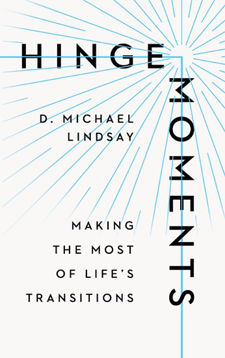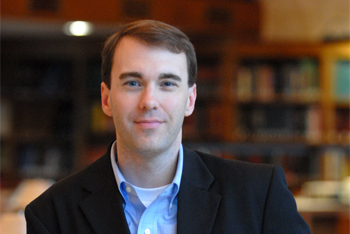While D. Michael Lindsay was writing his latest book, “Hinge Moments: Making the Most of Life’s Transitions,” he experienced one himself.
He had been president of Gordon College in Wenham, Massachusetts, since 2011. But he began to discern that it was time to step away, and in fall 2020 he announced his decision to resign.
It was an anxious period — until he was named president of Taylor University in Upland, Indiana, a role he will step into in August.
“I started off working on the book project thinking it would be mostly for college students, and in the end, I actually wrote a book that spoke to my own life,” he said.
In some ways, it speaks to everyone’s life right now, as the world begins to reorient itself post-pandemic.

Lindsay, a sociologist, based the book on hundreds of interviews with leaders in many fields. From those interviews, he distilled seven phases of transition, which he explores in the book.
Lindsay is a graduate of Baylor University and earned his Ph.D. in sociology from Princeton University and graduate theological degrees from Oxford University and Princeton Theological Seminary.

He is the author of several books, including “Faith in the Halls of Power: How Evangelicals Joined the American Elite.”
Lindsay spoke with Faith & Leadership’s Sally Hicks about his new book and the personal hinge moments that informed it. The following is an edited transcript.
Faith & Leadership: What do you want people to take away from this book? Whom do you hope to reach with it?
Michael Lindsay: I originally wrote “Hinge Moments” to help high school and college students think about the big decisions of life and how to navigate them.
But as I got into the writing project — and particularly as I went back and reviewed the 550 interviews on which the book is based — I realized that all of us experience significant changes in our lives.
Then when the coronavirus pandemic hit, I recognized that it was going to have such a profound impact not just on our society but on all our individual lives that everything was going to be different.
Change is instantaneous. Your spouse dies in a car accident. You propose to a woman and she says yes. You get hired for a job or you’re laid off from your work. We can remember the precise moment it happens in our life. And how we respond in those moments and to those moments has a disproportionate impact on the rest of our lives.
In fact, you and I can probably organize our whole life journey around a collection of 10, 12, 15 hinge moments. In God’s providence, we are being prepared for some of those changes that come our way, and we respond to them.
Transition is a long process that takes many months — in some cases, years. Change is instantaneous, but in all of them, those hinge moments orient the rest of our life.
Transition is a long process that takes many months — in some cases, years. Change is instantaneous, but in all of them, those hinge moments orient the rest of our life.
F&L: There is the poignant story — and I am sorry for your loss — of how a death in your family prompted you to make a big change.
ML: My 32-year-old cousin, Trent, was killed in a car accident. He was like a little brother to me. His death was very much a wake-up call that I’m not promised tomorrow. The opportunities that are before you today, you’re not guaranteed they’ll be available to you in five to 10 years.
I had been approached about the presidency at Gordon College by a search consultant, and I had said to him, “I’d love to be a college president, but I think it’s down the road, not immediately.”
But Trent’s death was a real moment of reckoning for me, and I recognized that if God in his providence had given me an opportunity and I was interested in it, I should really pursue it.
I’ve had 10 amazing years at Gordon and loved the experience of being a college president.
While I was working on this book, however, I began getting a sense that maybe God was calling me to a new work. Originally, that was a very upsetting process, because I’ve loved what I’ve done at Gordon. Our family has been very happy. I have a great relationship with my board.
But I began to get a degree of restlessness in my spirit. Many of the things I had come to do were wrapping up, and so I needed a new vision for my leadership or what work we’d be doing in the days ahead.
In the midst of that, I actually became convinced that perhaps God was calling me to give up the role, and so I did. I decided to step down and announce my resignation this past fall, and it was difficult, because I didn’t have another job. I hadn’t figured out what was next.
In the book, I talk about seven phases of transition. By far, the most difficult moment in any transition in our life is what I call the intersection phase. It’s this liminal moment of being betwixt and between.
I experienced that for a number of months in my own journey, but as it turned out, I’m going to be the new president of Taylor University, and I’m very happy.
F&L: Congratulations.
ML: I’m beginning to see that I’m coming out of that intersection phase and moving to a more positive, productive phase. But each of us experiences those inflection points in our life, those hinge moments around which the rest of life depends.
F&L: Explain the metaphor of the hinge.
ML: The benefit of a hinge is that it allows a door to both stay open and stay closed. It serves a dual purpose.
It opens and closes. So it must be with our own virtues and our own values. You’ve got to have values that both open up and create opportunities for you but also allow you to appropriately say, “You know what? Either that is coming to a close or that pathway is not the right one for me.”
A large part of the Christian life is having a sense of discernment around these kinds of opportunities.
F&L: Did saying yes to the opportunity at Gordon better prepare you for your second choice to move to a new university?
ML: It certainly did. The nice thing about it is that as we gain experience, as you cross through more doors, you get wiser.
You’re more attentive to what’s happening within your spirit, so you have a better understanding and you also are better attuned to be able to listen to the perspective of others that can help guide you.
I would say that the matter of owning your own faith is a very important hinge moment.
The book opens with the story of Francis Collins, the director of the [National Institutes of Health], and how Francis really encountered his first big hinge moment of his life when he was a medical resident at UNC-Chapel Hill and he was attending to an elderly woman who was close to dying.
He said, “I watched her as she was getting closer and closer to death, and I would have thought that she would abandon her faith when in fact she became more certain of her faith, and it didn’t make logical sense.”
He said, “I was the one who was up in the middle of the night thinking about her, and yet she was the one who was dying, and she seemed to be so at peace about it.”
In a conversation they had, she basically asked him, “Well, what is it that you believe?” And he said that simple question really got under his skin and led him on a two-year odyssey to begin to think about world religions and, in the end, embrace a faith in Jesus Christ.
Well, each of us has to go through our own sort of journeys of discovery, but after you go through one of those, you’re better prepared for the next one.
I would say that the matter of owning your own faith is a very important hinge moment.
F&L: Are there things people can do to be better prepared when the moments arise?
ML: I wrote the book as a way of helping, I hope, a lot of people get better prepared for their next hinge moment. I’m really convinced that the pandemic is opening up societywide hinge moments that all of us are going to experience over the next six to 12 months.
It’s going to fundamentally change things in our lives in a pretty significant way — everything from how we think about going to church to how we shop for clothes to how we make decisions about vacation in our free time.
And because all of that is occurring, it seems to me that there’s just a range of possibilities of how we can respond to the problems and the changes — but also the real chance of a new start.
The reason why people grieve over change, the reason why it’s so hard, is because fundamentally they’re afraid of the loss that they’re going to experience. So much about hinge moments is actually coming to grips with the reality.
We hold these things loosely, because in the end, we’re not in control. But we are equipped to be able to respond in God’s providence to those big junctures in our life and to handle them as best as possible.
F&L: Throughout the book, you write about seven phases of transition. Talk about the phase that people find most difficult.
ML: I came to this analysis after really reviewing the life journeys of 550 senior leaders on which the book is based. I interviewed Presidents Carter and Bush, cabinet secretaries like Condi Rice and Colin Powell, military commanders, 200 CEOs, including 20 of the Fortune 100 CEOs.
I interviewed the presidents of every major nonprofit in America, including the presidents of Harvard, Stanford and Princeton, so it’s a who’s who of people who have been in leadership roles.
I concluded, after looking at their lives and their journeys, that each of them goes through these different phases of transition. Now, they may not name it exactly this way, but in fact [these phases] are the process.
Just as we’ve come to recognize that there are stages of grief that we go through in times of sadness, death or loss, so also there are seven stages of transition we experience with any major change.
I think part of the redemptive work that occurs in “Hinge Moments” is helping to see that it’s going to take us to the other side where we will be stronger and better if we make peace with it.
By far the most difficult phase is this one that I call the intersection phase. It’s where our confidence is at its lowest level.
We don’t have the same systems of support, because we’re not yet integrated into a new community but we’ve already become, in one way or another, dislodged from the community that we thought was going to shape and guide us. So it’s really tough, really challenging.
I would say the realization phase is the one that’s most meaningful. It’s when you begin to realize that actually this change that’s coming to your life has been able to be redeemed for a greater good.
F&L: I’m curious to know why you called the final phase “realization.” You didn’t title it “success” or “you’ve arrived.”
ML: I think it’s basically the moment when you actually begin to come into your own. It is the recognition that the growth and development you’ve gone through on this journey has actually come to fulfillment, and it’s produced a greater degree of maturity and strength.
Certainly, transitions can leave scars of some type, but those scars also accompany the powerful stories — stories of recovery, redemption, even stories of resurrection in our life. They give us a greater sense of confidence and make it easier to face similar kinds of challenges in the future.



